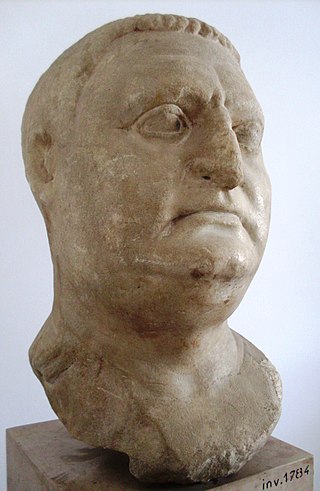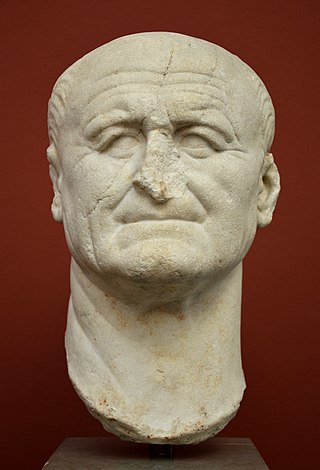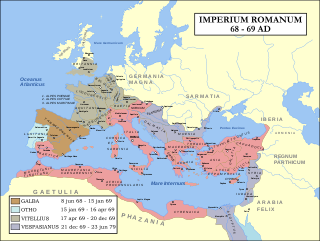
Galba was Roman emperor, ruling from AD 68 to 69. He was the first emperor in the Year of the Four Emperors and assumed the throne following Emperor Nero's suicide.

Otho was Roman emperor, ruling for three months from 15 January to 16 April 69. He was the second emperor of the Year of the Four Emperors.

Aulus Vitellius was Roman emperor for eight months, from 19 April to 20 December AD 69. Vitellius became emperor following the quick succession of the previous emperors Galba and Otho, in a year of civil war known as the Year of the Four Emperors. Vitellius added the honorific Germanicus to his name instead of Caesar upon his accession. Like his predecessor, Otho, Vitellius attempted to rally public support to his cause by honoring and imitating Nero who remained popular in the empire.

Vespasian was Roman emperor from 69 to 79. The last emperor to reign in the Year of the Four Emperors, he founded the Flavian dynasty, which ruled the Empire for 27 years. His fiscal reforms and consolidation of the empire brought political stability and a vast building program.

AD 69 (LXIX) was a common year starting on Sunday of the Julian calendar. In the Roman Empire, it was known as the Year of the consulship of Galba and Vinius. The denomination AD 69 for this year has been used since the early medieval period, when the Anno Domini calendar era became the prevalent method in Europe for naming years.

The 60s decade ran from January 1, AD 60, to December 31, AD 69.

The Praetorian Guard was an elite unit of the Imperial Roman army that served as personal bodyguards and intelligence agents for the Roman emperors.

The Year of the Four Emperors, AD 69, was the first civil war of the Roman Empire, during which four emperors ruled in succession: Galba, Otho, Vitellius, and Vespasian. It is considered an important interval, marking the transition from the Julio-Claudians, the first imperial dynasty, to the Flavian dynasty. The period witnessed several rebellions and claimants, with shifting allegiances and widespread turmoil in Rome and the provinces.

Legio III Gallica was a legion of the Imperial Roman army. The cognomen Gallica suggests that its earliest recruits came from veterans of the Gallic legions of Gaius Julius Caesar, a supposition supported by its emblem, a bull, a symbol associated with Caesar. The legion was based for most of its existence at Raphanea, Roman Syria, and was still active in Egypt in the early 4th century.

The Parallel Lives is a series of 48 biographies of famous men written by the Greco-Roman philosopher, historian, and Apollonian priest Plutarch, probably at the beginning of the second century. It is also known as Plutarch's Lives ; Parallels ; the Comparative Lives ; the Lives of Illustrious Men ; and the Lives of the Noble Greeks and Romans. The lives are arranged in pairs to illuminate their common moral virtues or failings. The surviving Parallel Lives comprises 23 pairs of biographies, each pair consisting of one Greek and one Roman of similar destiny, such as Alexander the Great and Julius Caesar, or Demosthenes and Cicero. It is a work of considerable importance, not only as a source of information about the individuals described, but also about the times in which they lived.
Gaius Licinius Mucianus was a Roman general, statesman and writer. He is considered to have played a role behind the scenes in the elevation of Vespasian to the throne.
The Battle of Bedriacum refers to two battles fought during the Year of the Four Emperors near the village of Bedriacum, about 35 kilometers (22 mi) from the town of Cremona in northern Italy. The fighting in fact took place between Bedriacum and Cremona, and the battles are sometimes called "First Cremona" and "Second Cremona".
Lucius Calpurnius Piso Frugi Licinianus (38–69) was a Roman nobleman who lived in the 1st century. His adoption by the Roman emperor Galba on 10 January 69 AD precipitated their joint murder by Otho, who had expected to be adopted instead. Otho then became the second emperor of the Year of the Four Emperors.
Titus Flavius T. f. T. n. Sabinus was a Roman politician and soldier. A native of Reate, he was the elder son of Titus Flavius Sabinus and Vespasia Polla, and brother of the Emperor Vespasian.
Cornelius Fuscus was a Roman general who fought campaigns under the Emperors of the Flavian dynasty. He first distinguished himself as one of Vespasian's most ardent supporters during the civil war of 69 AD, known as the Year of the Four Emperors. Vespasian's son Domitian employed Fuscus as prefect of the Praetorian Guard, a post he held from 81 until his death.

The gens Antonia was a Roman family of great antiquity, with both patrician and plebeian branches. The first of the gens to achieve prominence was Titus Antonius Merenda, one of the second group of Decemviri called, in 450 BC, to help draft what became the Law of the Twelve Tables. The most prominent member of the gens was Marcus Antonius.
Fabius Valens of Anagnia was a Roman commander favoured by Nero. Valens was an undisciplined character but not without talent; he tried to portray himself as witty by behaving frivolously.
Antonius Flamma was a politician of ancient Rome who served as governor of the Roman province of Cyrenaica under the emperor Nero. He was banished at the beginning of Vespasian's reign for his extortion and cruelty. He was not a foreign politician, but was in fact a member of the native ruling class of Cyrenaica. His son was a priest of the local cult center of Apollo.
Lucius Antonius Naso was an man of ancient Rome who served as tribune of the Praetorian Guard in the year 69, and procurator of the Roman province of Bithynia et Pontus during the reign of Vespasian. It is likely he was from Heliopolis, as that is where the most notable inscription about his life was found.
Marcus Aponius Saturninus was a Senator of Imperial Rome, active in the latter half of the first century AD. His parents, also of senatorial rank, were wealthy and owned property in Egypt. He appears in the Acta Arvalia in the year 57 AD; classicist Ronald Syme suggests that he was made a member of the Arval Brethren due to the influence of Annaeus Seneca. Saturninus is mentioned as being present in 66 for sacrifices on the Capitol with the emperor Nero. Tacitus calls him a consul, but the date of his office is uncertain. He may have been consul in 55; Classical scholar Paul Gallivan at the University of Tasmania has argued that Saturninus was suffect consul between 63 and 66, by which time he was recorded as becoming promagister.
![]() This article incorporates text from a publication now in the public domain : Smith, William (1870). "Novellus, Antonius". In Smith, William (ed.). Dictionary of Greek and Roman Biography and Mythology . Vol. 2. p. 1211.
This article incorporates text from a publication now in the public domain : Smith, William (1870). "Novellus, Antonius". In Smith, William (ed.). Dictionary of Greek and Roman Biography and Mythology . Vol. 2. p. 1211.









